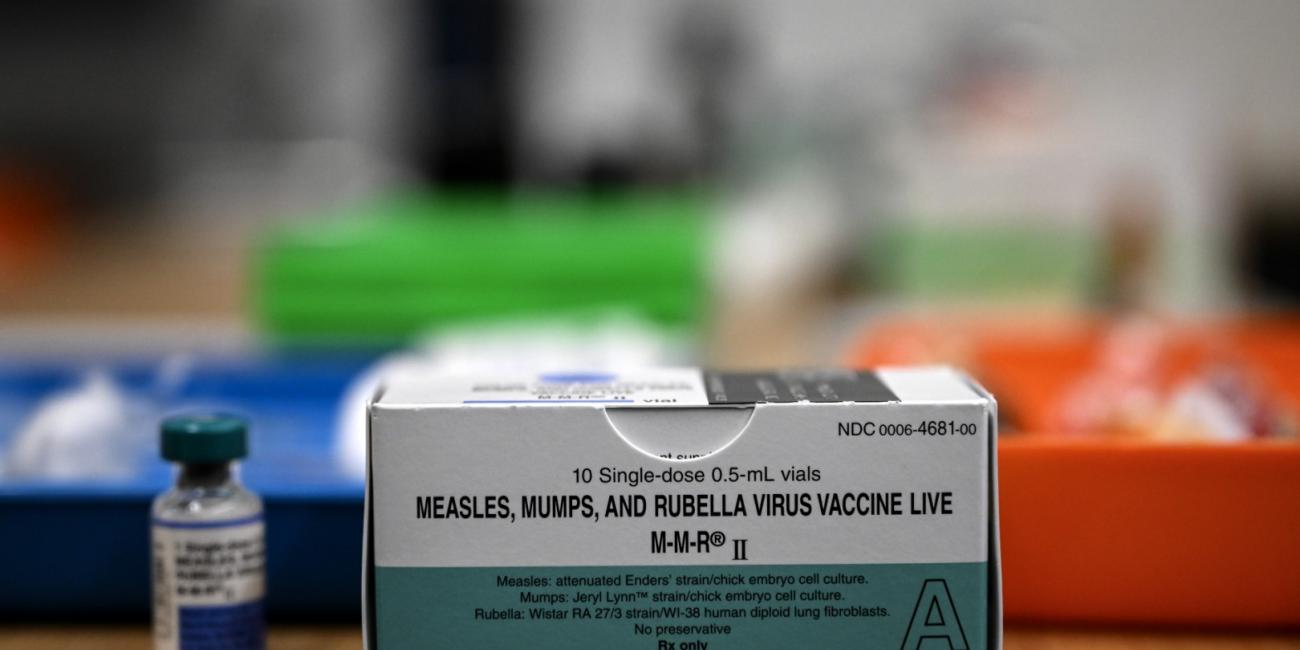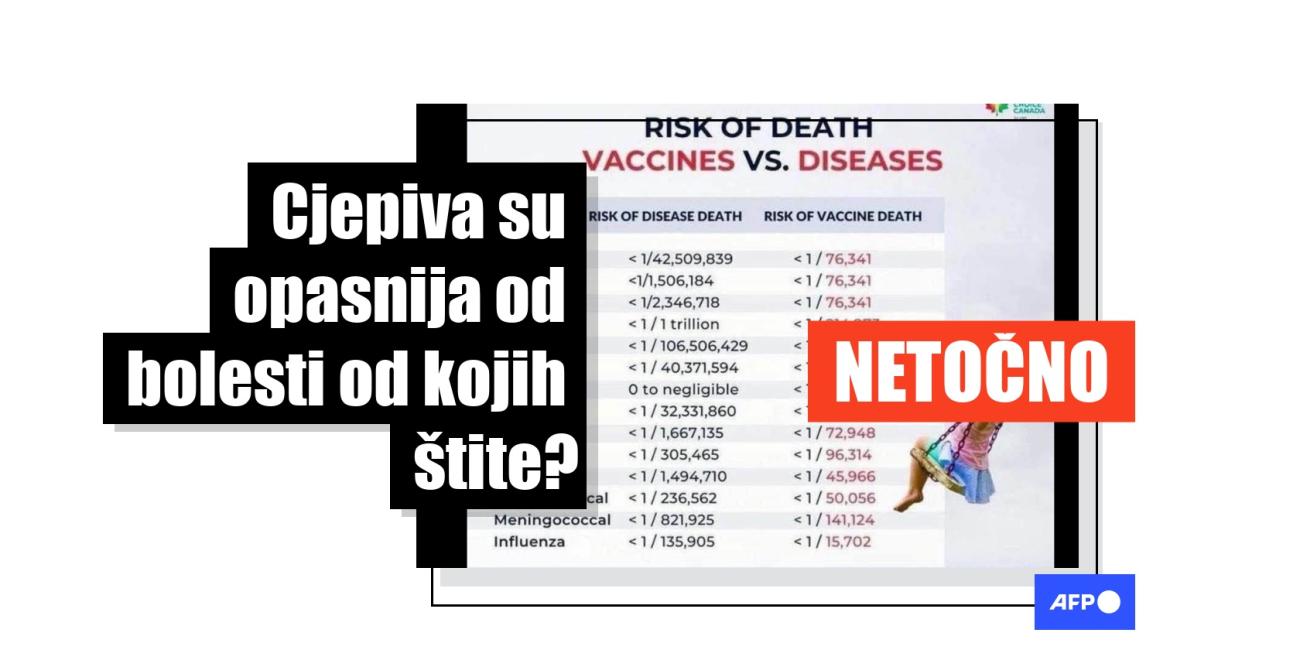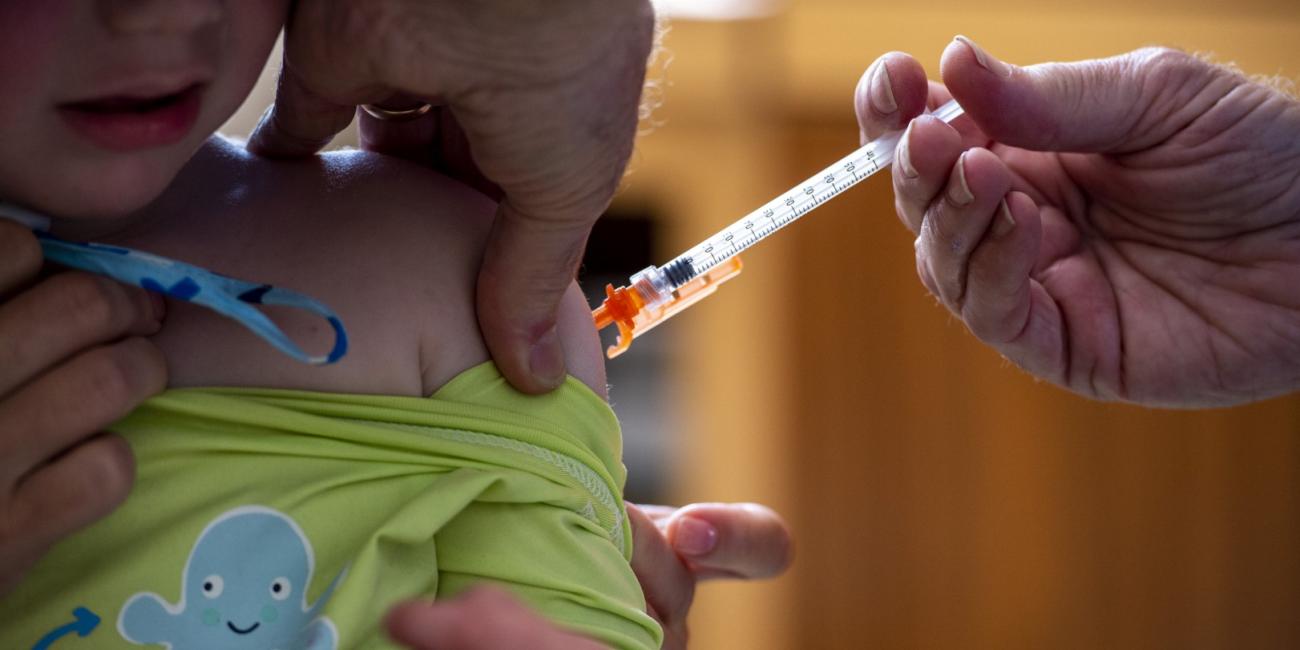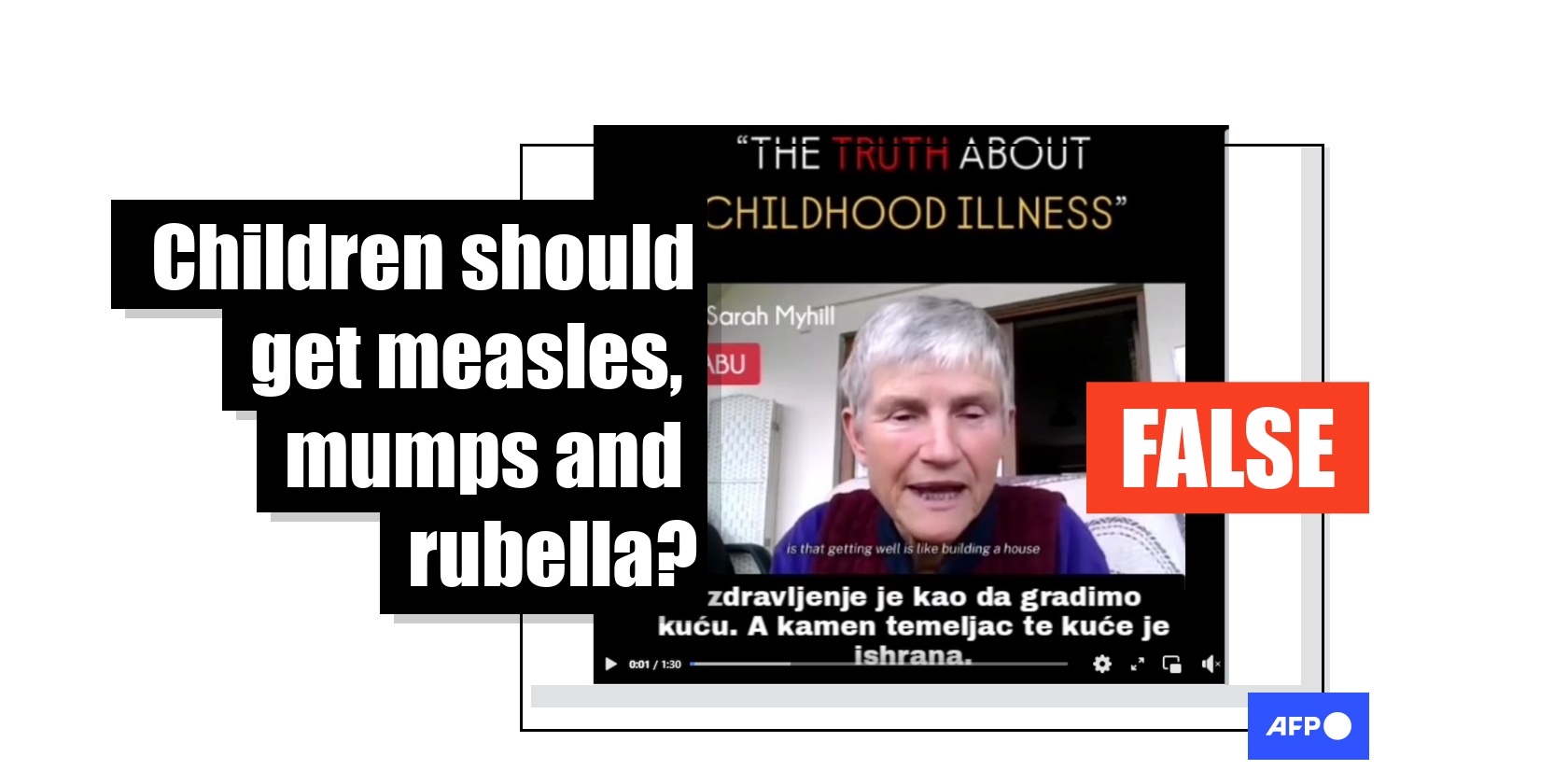
No evidence that contracting childhood diseases protects long-term health: experts
- Objavljeno 22. travnja 2025. u 12:12
- Ažurirano 22. travnja 2025. u 12:25
- Minuta potrebno za čitanje: 6
- Autor: Ivan FISCHER, AFP Croatia
"Do you remember how our mothers would take us to our friends so we would 'pick up' childhood diseases," wrote a Facebook user in Croatian in a post on February 8, 2025.
It included a short clip of British doctor Sarah Myhill saying children should catch infectious diseases such as measles, mumps, rubella and chickenpox, likening it to software that programs their "immune system hardware".
The same video was shared across Facebook more than 100 times with the headline "The truth about childhood illness" and accompanied by similar captions. It also spread on Telegram, where it was viewed more than 1,200 times.
In the minute-and-a-half-long clip, Myhill also says that contracting these childhood diseases "protects against cancer, heart disease and dementia later on in life".
However, the claims are false. There is no scientific evidence that there are benefits to contracting these infectious diseases in childhood.
Experts told AFP, that measles, mumps and rubella are diseases that carry significant health risks, including death, and may cause other health issues later in life. Measles, in particular, harms the immune system and makes it more vulnerable to other diseases.
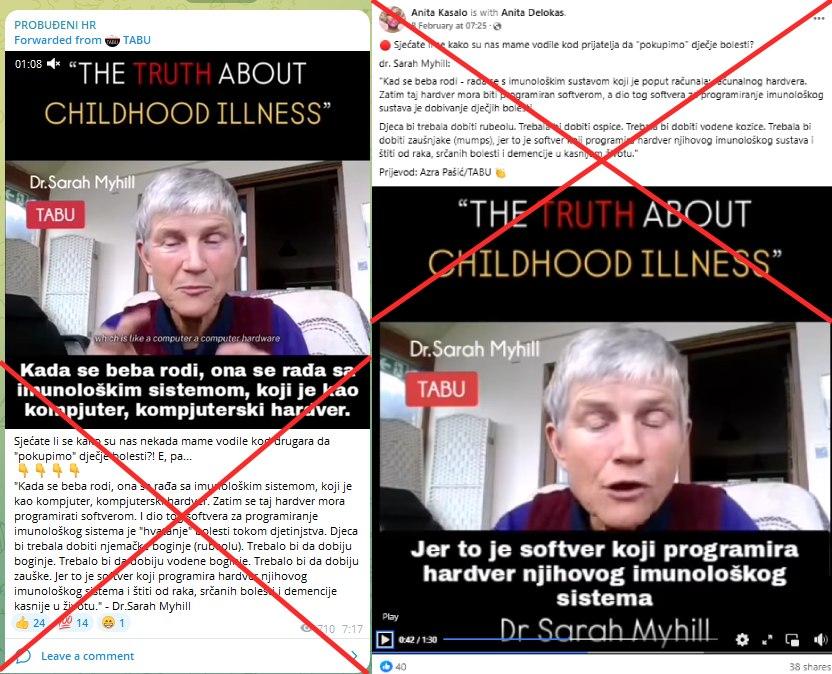
AFP used an advanced internet search to find the origin of the video.
British physician Sarah Myhill appeared as a guest on "The Wellness Way" podcast on January 23, 2025 in an hour-long episode titled "Childhood Immunity, Nutrient Deficiencies and Wellness Tips with Dr Sarah Myhill". The episode's description called her "a trailblazer in the field of natural health and immunity".
However, Myhill, a private doctor based in Wales in the United Kingdom, was suspended from practicing medicine for a year in 2010 by the British General Medical Council (GMC) after prescribing treatments that other experts claim "had no clinical or biochemical basis". She was again suspended in 2023 for promoting vitamins and iodine as treatments for Covid-19 (archived here and here).
Measles and mumps can be deadly
Three of the four diseases mentioned in the video -- measles, mumps and rubella -- have readily available vaccines which are provided as part of Croatia's mandatory immunization programme (archived here). These vaccines are usually administered in a combined shot known as the MMR vaccine (archived here).
According to the Croatian Public Health Authority's (HZJZ) Infectious Diseases Epidemiology Service, it is better to vaccinate children against these diseases than to allow them to contract them naturally.
"Getting sick with a disease that can be prevented by vaccination brings a higher risk from developing complications from these diseases, and in some cases can lead to death," said the Epidemiology Service on February 14, 2025.
In the case of measles, the service stressed that the risk of developing encephalitis, a dangerous inflammation of the brain, is one in 1,000 measles cases (archived here). The risk of developing it after vaccination is just one in one million.
Mark Muscat, the technical officer in the Vaccine-preventable Diseases and Immunization programme at the World Health Organization's Regional Office for Europe, told AFP on February 13 that the agency recommends vaccination against measles, mumps and rubella to avoid serious complications, including death, especially in the case of measles, and birth defects in the case of rubella.
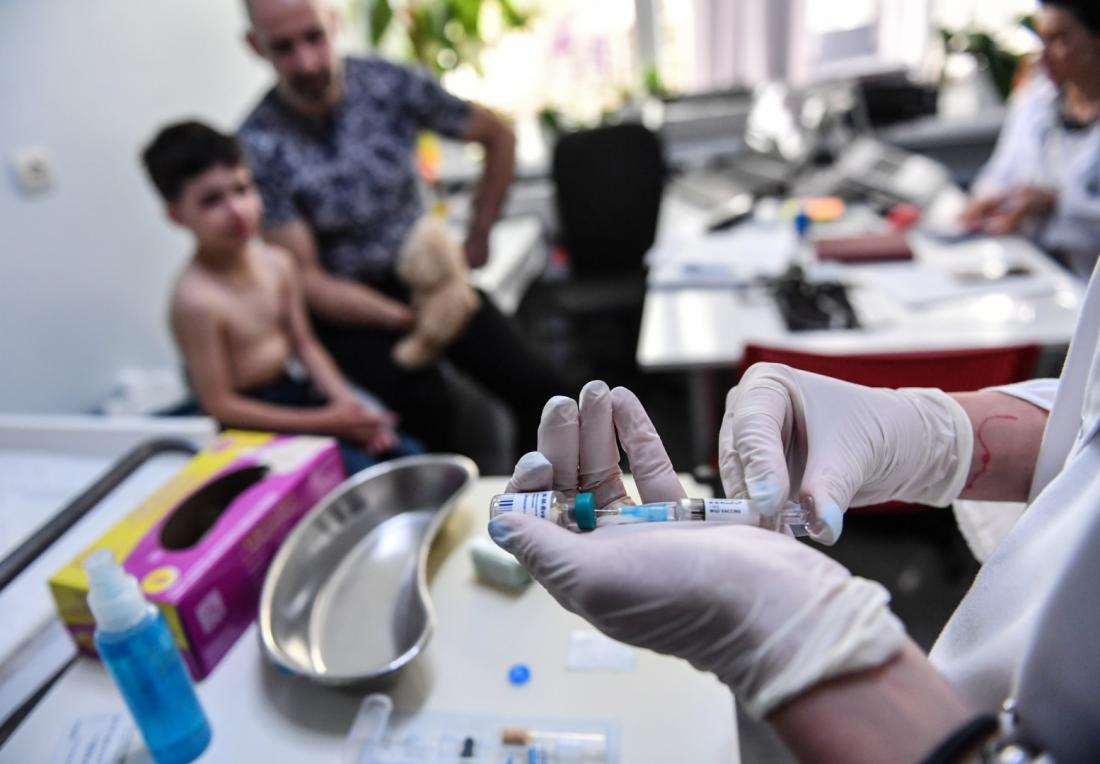
"These diseases are effectively prevented through routine vaccination offered by national immunisation programmes," said Muscat. "The vaccination itself is proven to be very safe, with very small chances of adverse reactions."
The most recent WHO position paper on measles notes that the disease causes complications in approximately 30 per cent of reported cases, depending on age and underlying conditions (archived here). Furthermore, natural measles infection also causes significant immunosuppression -- a weakening of the immune system -- that can last for several years and has been linked to increases in overall infectious disease mortality in children.
Both Muscat and the HZJZ Epidemiology Service noted that measles infection can cause subacute sclerosing panencephalitis (SSPE), a fatal disease that develops several years after the infection in between seven to 300 cases per million (archived here). A 2017 study found that SSPE could appear as often as one in 600 cases of unvaccinated children who contract the disease before they are 12 months old, or one in 1,300 cases for children less than five years old when they contracted measles (archived here).
A mumps infection also carries the risk of meningoencephalitis -- a potentially life-threatening inflammation of the brain and its surrounding membranes (archived here and here). Mumps can cause swelling of the testes or inflammation of the ovaries, which can later reduce a patient's fertility. It can also cause acute pancreatitis (archived here).
In healthy persons, rubella is usually a mild disease, the HZJZ told AFP (archived here). "However, if a non-immunised pregnant woman becomes ill, especially during the first trimester, it increases the risk of spontaneous abortion," said HZJZ. "If the pregnancy persists, the newborn is usually born with birth defects - the congenital rubella syndrome (CRS)." This syndrome can include hearing loss, cataracts and blindness, and intellectual disabilities (archived here).
Not comparable to chickenpox
Myhill mentions chickenpox in the same context as measles, mumps and rubella, but experts say it cannot be compared to the other three diseases when it comes to relative danger (archived here).
Chickenpox complications are rare and usually take the form of a secondary infection -- the burst blisters can become infected by bacteria (archived here). Chickenpox can still be dangerous for pregnant women and people with weakened immune systems.
Several EU countries such as Cyprus, Germany, Greece, Lithuania and Luxembourg, nevertheless recommend vaccinating children against chickenpox.
In Croatia, the chickenpox vaccine is not a part of the regular vaccination programme, however, it is provided to groups at risk of developing complications. "For persons with diseases which compromise the immune system (...), persons with severe forms of dermatitis, and persons in close contact with patients at high risk of complications and who cannot receive the vaccine", HZJZ told AFP. This includes healthcare workers in obstetrics, infectious and hematology wards. "This indirectly protects immunocompromised persons that they care for, as (the patients) cannot receive a live vaccine due to their weakened immune systems."
No evidence infection protects against other diseases
AFP used an advanced internet search and Google Scholar -- a repository of scientific articles -- to look for any study that may have found a link between infection of childhood diseases and later incidence of cancer, cardiovascular diseases and dementia. We found no such study, however, we discovered other studies linking measles infection and resulting SSPE with early onset dementia, including here or here (archived here and here).
Muscat told AFP that the WHO is "not aware of any credible scientific evidence to support the claim that natural infection with measles, mumps, or rubella provides protection against cancer, cardiovascular disease, or dementia later in life." Natural measles infection "actually weakens the immune system for several years and increases susceptibility to other diseases", said Muscat.
The HZJZ Epidemiology Service was also unaware of any such research, and noted that it would be extremely unethical in any case "to deliberately expose the children to diseases that could be prevented with vaccines, and expose them to all the aforementioned complications."
Even if the immune response from diseases could carry long-term benefits, the immune response from vaccines could potentially provide the same benefit with significantly fewer risks. "The weakened viruses in the vaccine are very effective in stimulating the immune system to provide immunity," said Muscat, adding that they can do so "without causing the diseases themselves, nor the longer-term negative consequences of the diseases, including immunosuppression and possible disability."
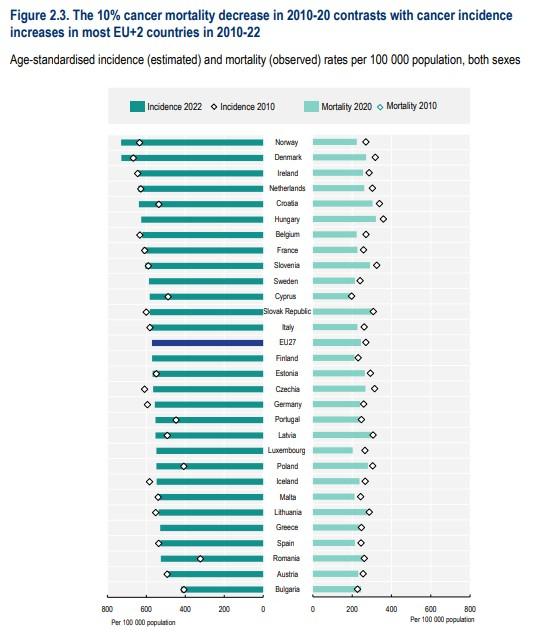
Finland cancer claim
At the beginning of the misleading video, Myhill makes a separate claim that "Finland is the only country in Europe where the incidence of cancer is falling". She links this to the 1984 decision of the Finnish government to supplement all fertilizers in the country with selenium to combat selenium deficiency (archived here).
While there are health benefits associated with increasing the selenium intake of the population, there is no evidence that this increase reduces cancer incidence.
Finland's data on cancer incidence shows that the number of cancer cases and deaths increased between 2020 and 2022 (archived here and here).
According to the 2022 OECD data (archived here), there were many European countries where cancer incidence decreased compared to 2010, such as Belgium, Slovakia, Italy, Czechia, Germany, Iceland, Lithuania and Spain. Finland's 2022 cancer incidence rate was similar to the EU average.
Copyright © AFP 2017-2026. Za bilo kakvu komercijalnu uporabu ovog sadržaja potrebna je pretplata. Kliknite ovdje za više informacija.
Vidjeli ste sumnjivu informaciju na društvenim mrežama?
Kontaktirajte nas

